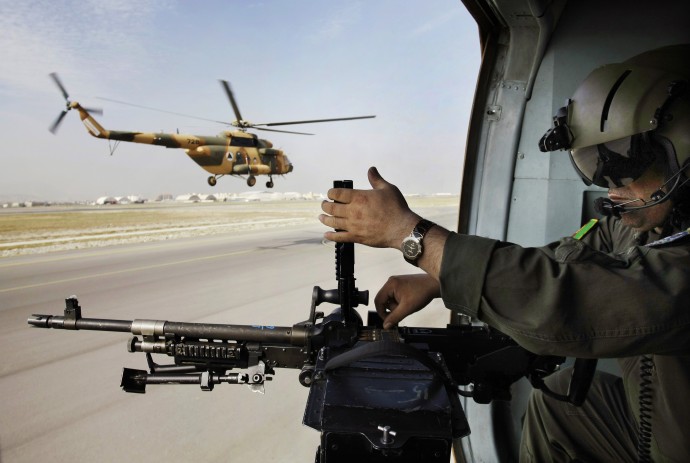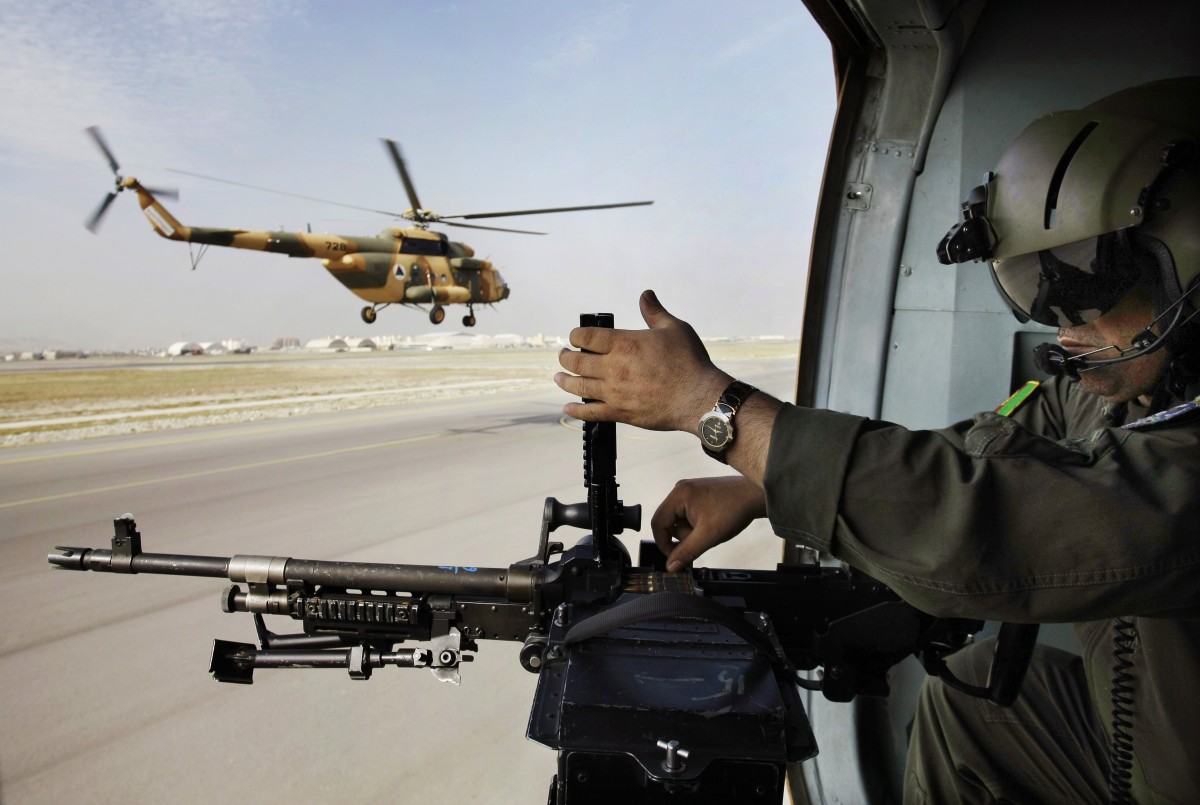
(NEW YORK) MintPress — The war in Afghanistan entered its 12th year on Sunday, the longest-running period of sustained warfare in U.S. history.
The amount of time the country has been engaged in “Operation Enduring Freedom,” launched on Oct. 7, 2001, has surpassed the duration of both the Vietnam War and World War I, World War II and the Korean War combined.
And exactly one week before the war’s 11 year anniversary, the number of American military and civilian personnel killed in Afghanistan reached 2,000.
It’s not surprising, therefore, that the American public is increasingly impatient. The latest New York Times/CBS News poll found that two-thirds of those surveyed — 69 percent — thought that the U.S. should not be at war in Afghanistan. In late 2011, 53 percent said that Americans should no longer be fighting in the conflict.
And this weekend, in cities across the country, anti-war demonstrators were vocalizing their dissatisfaction.
In California, Occupy San Diego and the San Diego Coalition For Peace and Justice were just two groups in the state calling on the government to end the war and help rebuild Afghanistan.
Hundreds of protesters marched in Los Angeles on Saturday morning in an effort to shut down the Hollywood Army Recruitment Center. Several groups, including Occupy Los Angeles and Act Now to Stop War and End Racism (A.N.S.W.E.R.), gathered at a main intersection before beginning the demonstration.
They called for the complete withdrawal of all troops from Afghanistan, an end to drone attacks and the redirection of all funding for wars to jobs, housing, education and health care.
Protesters said they believe that military recruiters take advantage of students and young people, sending them to die for Wall Street.
Several anti-war groups also held a rally on Sunday in Salt Lake City, stating that their goal was to get the people of their state to come together and voice their opposition to U.S. wars around the world. The October 7th Committee said the focus of their anti-war movement is to stand against acts of violence at home and abroad, and to call for an immediate end to U.S. intervention.
“This is a jumping-off point, we’re hoping people go to the streets, stand up for what they believe in, which is no war,” said one End War Abroad organizer.
Further east, the Minnesota Peace Action Coalition (MPAC) organized an anti-war march and rally in Minneapolis on Sunday.
“The majority of people of Afghanistan want all foreign troops out of their country. The explosion of so-called ‘green on blue’ attacks demonstrates that the presence of occupation forces can only lead to more war,” it said in a statement.
“Despite claims that the U.S. in winding down the war in Afghanistan, 68,000 U.S. troops remain. While the U.S. government talks about withdrawal by the end of 2014, there are plans to leave thousands of U.S. troops in Afghanistan until perhaps 2024.”
The statement continues, “How many U.S. soldiers and Afghans must lose their lives before our government finally admits that the war is wrong and it is time to bring the troops home?”
And in the south, a group of students and community members rallied at Florida State University (FSU) to protest, chanting, “No blood for oil! U.S. off Afghani soil!”
Vets take action
Last but certainly not least, Veterans for Peace (VFP), the only national veterans organization calling for the abolition of war, organized a vigil in New York City on Sunday night, when supporters from around the country congregated in lower Manhattan near the Vietnam Veterans Memorial Plaza.
Speakers included Vietnam veteran Bishop George Packard, Pulitzer Prize-winning war correspondent Chris Hedges and Iraq combat veteran Jenny Pacanowski. The protesters then began reading the names of the New York soldiers killed in Vietnam who are commemorated at the plaza and members of the military who died in Afghanistan and Iraq.
After 10 p.m., the police told the group that the park was officially closed and that if they stayed they would be arrested. Many chose to continue reading names and laying flowers until they were handcuffed and taken away. The group said that 25 people, most of them veterans, were arrested.
Said former VFP President Mike Ferner, “I bet a lot of the arresting officers tonight were also military veterans; a number of them didn’t look too happy with the job they were told to do.”
Opposition to war overdue
There was initially little outcry in the U.S. against the Afghanistan war, which was seen as a response to the 9/11 terrorist attacks and was supported by a majority of the American public.
Over time, though, opposition to the war has grown more widespread, partly because of weariness with the length of the conflict, and partly as a result of the ensuing and unpopular invasion of Iraq.
Other factors include the views that the U.S. invasion of Afghanistan was illegal under international law, that the continued military presence constitutes a foreign military occupation, that the war does little to prevent terrorism and that continued involvement is based on geo-political and corporate interests.
Also fueling the opposition are the large number of civilian casualties, the high cost to taxpayers and estimates that the war could drag on for years.
Plans for pulling out
Shortly after taking office, President Obama moved to bolster American military might in Afghanistan. In February 2009, after eight years of war, he announced an increase of 17,000 troops to “stabilize a deteriorating situation in Afghanistan,” an area he said had not received the “strategic attention, direction and resources it urgently requires.”
On Dec. 1, 2009, Obama revealed plans for the deployment of an additional 30,000 military personnel to help the Afghan government contain the insurgency and develop a stronger domestic security force as well as improve self-governance.
The surge brought the total American presence there to almost 100,000.
When Obama made the announcement, he also detailed an exit strategy — the U.S. would begin drawing down troops in 2011 and leave Afghanistan entirely by 2014.
That was largely because polls show that a large majority of the American public, including a strong plurality of Republicans, would like the troops to leave sooner rather than later.
Last month, the U.S. military fully withdrew the last of the troops sent during the surge. But there are lingering concerns that tens of thousands of troops could remain in Afghanistan until at least 2020 to train local security forces.
President Romney?
There are also growing fears that if Republican challenger Mitt Romney wins the race for the White House, his administration could scrap Obama’s plans for withdrawing from Afghanistan.
Romney used an address Monday at the Virginia Military Institute to argue that Obama’s approach to foreign policy has reduced U.S. influence around the world, and that al-Qaida has grown stronger during his presidency, despite the death of Osama bin Laden.
“It is the responsibility of our president to use America’s great power to shape history — not to lead from behind, leaving our destiny at the mercy of events,” he said. “Unfortunately, that is exactly where we find ourselves in the Middle East under President Obama.”
Romney’s remarks included a vow to reverse a set of automatic spending cuts, which would fall heavily on the defense budget, set to take place at the beginning of 2013 failing any action by Congress.
Throughout the campaign, Romney has often criticized Obama’s approach to foreign policy over the past few years, including what he has called a “politically-timed” withdrawal of troops from Afghanistan that he said ignored the advice of U.S. generals.
Although Romney has not committed to a longer stay in Afghanistan, he has said that “withdrawal of U.S. forces from Afghanistan under a Romney administration will be based on conditions on the ground as assessed by our military commanders.”
He would surely have the support of some leading Republican politicians, including Sen. John McCain (R-Ariz), who has said, “I don’t see any kind of pressure to withdraw immediately.”
McCain argues that from a “pure military, tactical standpoint, we are winning, but, what the president keeps talking about, is how quick we’re going to withdraw.”
That view is clearly at odds not only with the vast majority of public opinion, but also with some in the military hierarchy.
As U.S. Defense Secretary Robert M. Gates memorably said on Feb. 25, 2011, “In my opinion, any future defense secretary who advises the president to again send a big American land army into Asia or into the Middle East or Africa should ‘have his head examined,’ as General MacArthur so delicately put it.”


